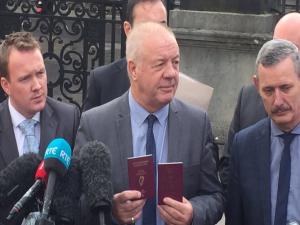
A judge has dismissed the UK's first legal challenge to Brexit.
Mr Justice Paul Maguire said the implications for Northern Ireland were still uncertain after Prime Minister Theresa May said she would begin exit negotiations with Europe before March.
A cross-party group of politicians had claimed the country should have a veto on an exit and said the Stormont Assembly should have a say on whether to trigger negotiations with Europe.
Raymond McCord, whose son was murdered by loyalist paramilitaries, had a separate Brexit challenge surrounding its impact on the peace process heard alongside that of the politicians at the High Court in Belfast.
Mr Justice Maguire said: "While the wind of change may be about to blow, the precise direction in which it will blow cannot yet be determined so there is a level of uncertainty, as evidenced by the discussion about how the Northern Ireland land border with Ireland was affected by withdrawal from the EU."
He added: "In respect of all issues, the court dismissed the applications."
The court did not consider the role of Parliament in the calling of talks - separate legal proceedings are taking place in England.
The Belfast case was heard earlier this month and concentrated on the impact on the Northern Ireland constitution of Mrs May's proposed action.
The judge rejected five grounds of appeal:
- That the Prime Minister's royal prerogative power cannot be exercised to trigger negotiations because it has been displaced by the 1998 Good Friday Agreement and associated laws and an Act of Parliament is required;
- That, if an Act of Parliament is required, the Stormont Assembly should consent to it;
- That the referendum result should not be given excessive weight when considering whether to trigger talks;
- That the Northern Ireland Office had failed to comply with equality legislation;
- That the Good Friday peace agreement which largely ended violence had created an expectation that there would be no change to Northern Ireland's constitutional status without the consent of its people.
The judge said it was difficult to see how the court could overlook the fact that the UK Parliament had retained the ability to legislate for Northern Ireland without any special procedure.
He said this power of the Prime Minister's was not one in which the court could intervene: "Any suggestion that a legitimate expectation can overwhelm the structure of the legislative scheme is not viable."
The judge said: "It is difficult to avoid the conclusion that a decision... following a national referendum is anything other than high policy.
"Accordingly it seems to fit well into the area of prerogative powers which are unsuitable for judicial review."
He added: "Such a decision does not lend itself to the process of judicial review and remains an example of the decision which should be viewed as non-justicible."
He said the process was being carried out by the Prime Minister or Brexit Secretary David Davis, not Northern Ireland Secretary James Brokenshire.
"In the court's view, section 75 (surrounding equality in Northern Ireland) has no purchase on this issue and is not engaged."
The judge added: "In the light of various factors the court does not consider that any of the arguments advanced under this issue are relevant and rejects them as a ground of challenge."
Mr Justice Maguire said he was not aware of any specific provision in the Good Friday Agreement or the 1998 Northern Ireland Act which established that any change to the constitutional arrangements for the Government of Northern Ireland, particularly UK withdrawal from the EU, could only be effected with the consent of the people of Northern Ireland.
He said if such a limitation existed it would be reasonable to have expected it to have been highlighted before the June referendum.
He said it would have the most unusual result of requiring a second referendum to be held in Northern Ireland within a short time of the people of Northern Ireland having gone to the polls on the same issue during a national referendum when the national outcome favoured withdrawal.
A Downing Street spokesman told a Westminster briefing: "Obviously we welcome the court's judgment this morning.
"It agrees that we can proceed to trigger Article 50 as planned.
"But I think what's important to stress, one of the concerns that was raised during this court case is that there is no reason to think that the outcome of the referendum will do anything to undermine the rock-solid commitment that the Government has to the settlement that was set out in the Belfast Agreement and to the people of Northern Ireland."
Some 56% of Northern Irish voters backed Remain but some unionist-dominated areas supported Leave. The largest party in Northern Ireland, the Democratic Unionists, campaigned for an exit.
A UK Government spokeswoman said the judgment agreed with ministers that the Government can trigger Article 50 as planned.
"As we have always made clear, we stand by our commitments under the Belfast Agreement and the outcome of the EU referendum doesn't change this.
"We will now await the outcome of the parallel cases under consideration by the England and Wales High Court, before setting out our next steps."
Mr McCord, whose son, Raymond McCord Jr, was murdered by the loyalist Ulster Volunteer Force (UVF) in north Belfast in 1997, said he was disappointed but vowed to take his case to the Supreme Court - the UK's highest court.
"We live in a democratic system. Fifty-six percent of the people of this country voted to remain."
He added: "We are right in what we are doing for the people of this country.
"I believe, like a lot of other victims, that if they come out of Europe the Tories will do away with the European Court of Human Rights, we will have very little chance then of holding the Government accountable."
Former Stormont justice minister David Ford, senior Sinn Fein Assembly member John O'Dowd and nationalist SDLP leader Colum Eastwood were among those supporting the challenge.
In London, an investment manager and hairdresser are taking legal action opposing the right of the Government to start the process of withdrawing the UK from the EU without a vote in Parliament.


 Swann refuses to rule out resigning if budget is not changed
Swann refuses to rule out resigning if budget is not changed
 Fresh inquests ordered into deaths of 15 killed in McGurk’s bomb blast
Fresh inquests ordered into deaths of 15 killed in McGurk’s bomb blast
 Trial ends after man accused of murder of young showjumper is found dead
Trial ends after man accused of murder of young showjumper is found dead
 A brief hearing and chaotic scenes as Donaldson makes first court appearance
A brief hearing and chaotic scenes as Donaldson makes first court appearance